The ESC Congress 2025 in Madrid, held together with the World Congress of Cardiology, marked not only the 75th anniversary of the European Society of Cardiology (ESC) but also one of the most memorable gatherings in cardiovascular health to date. With more than 33,300 participants, 6,390 faculty and presenters, national cardiac societies, patient organisations, and industry partners, this year’s congress was both a scientific landmark and a celebration of community.
FH Europe Foundation was proud to play an active role in this milestone event, amplifying the patient voice and ensuring that familial hypercholesterolaemia (FH), elevated lipoprotein(a) [Lp(a)], familial chylomicronaemia syndrome (FCS), and the broader agenda of cardiovascular disease (CVD) prevention and early detection remained high on Europe’s policy map.
One of the defining moments of ESC 2025 was the presence of His Majesty King Felipe VI of Spain, who addressed a packed auditorium in a special session on “The Heart and Society”, alongside Spanish Minister of Health Mónica García Gómez, ESC President Thomas F. Lüscher, and Prof. Valentin Fuster.
His Majesty’s words underscored the importance of dialogue, collaboration, and collective responsibility in protecting heart health, while also symbolising Spain’s pioneering role as the first country to adopt a national cardiovascular health plan:
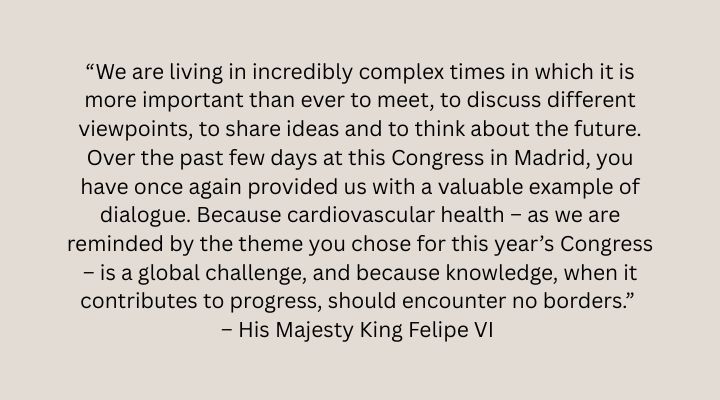
Further reinforcing this message, Spain’s Minister of Health Mrs Mónica García Gómez underwent a cardiovascular health check live at the congress – a powerful demonstration of the role of screening in preventing disease (including cholesterol and Lp(a) measurement).
At the Cardiovascular Community Breakfast organised by EFPIA, our Policy and Advocacy Manager Kitti Almer, delivered a strong intervention on how the forthcoming EU Cardiovascular Health Plan can best serve patients and Member States. Drawing on her experience as former Health Attaché of Hungary to the EU, Kitti highlighted the importance of early FH screening, cardiovascular health checks, and best-practice sharing to reduce Europe’s burden of disease.
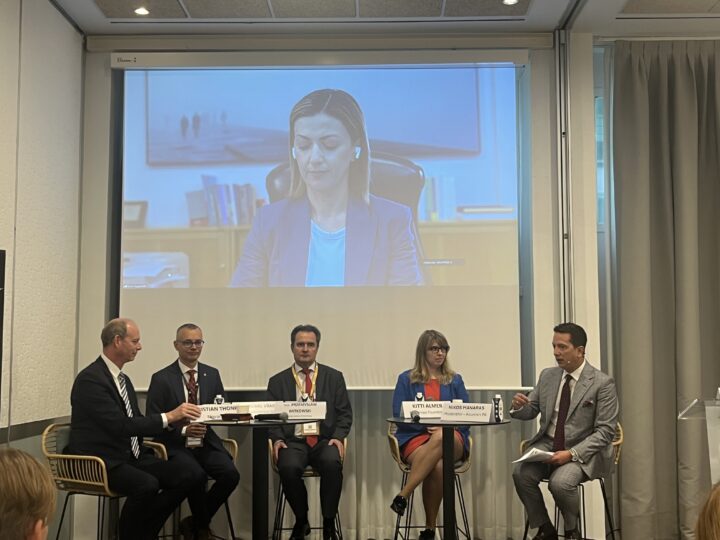
She was joined by leading policymakers, including the Alternate Minister of Health of Greece, who shared inspiring insights into Greece’s prevention programme and its nationwide free testing initiative, including cholesterol and Lp(a) screening.
Our CEO, Magdalena Daccord, joined MSD’s multi-stakeholder symposium on “Shaping the Future of Cardiovascular Care: The Role of Patient Empowerment and Multi-Stakeholder Collaboration”. Moderated by Prof. Fausto Pinto, the discussion featured voices from science and advocacy, including Maite San Saturnino of the Spanish Heart Foundation, who shared patients’ experiences as well as their strategic role as advisors to the government in Spain.
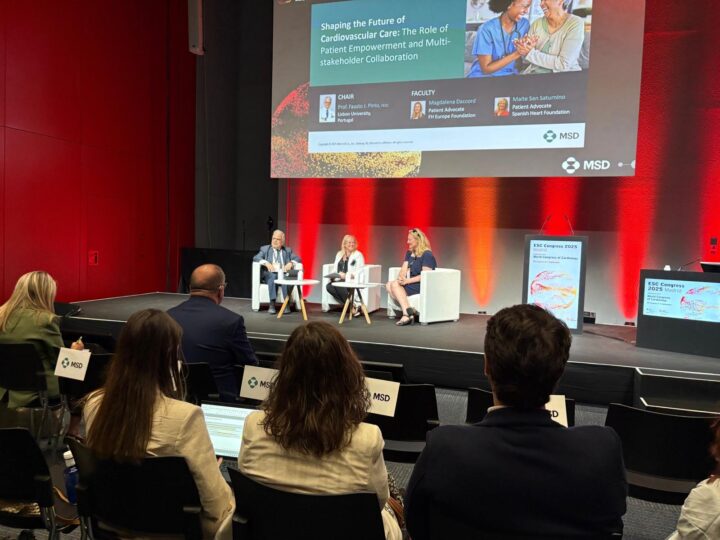
Magdalena emphasised the importance of early detection, patient health literacy, building trust between patients and healthcare systems, and strong cross-sector collaboration to ensure patients are partners in decision-making at every level.

Magdalena also spoke at the ESC/SEC policy roundtable “Cardiology Beyond Borders”, joining European and international leaders (including representatives from the Spanish Ministry of Health, OECD, ESC, and industry) to debate how structured cardiovascular health plans and equitable access to care can be advanced across borders.
Finally, FH Europe Foundation brought the patient voice to the World Heart Federation’s regional roundtable on lipid management. Magdalena shared insights from projects such as PERFECTO FH, FH-EARLY, and PerMed FH, ensuring that lived experience informed discussions on achieving lipid targets among Europe’s high-risk populations. She then shared her recent positive learnings from Czechia, like an example of a Patient Advisory Board to the government, and her worries about the standards of care in adult HoFH patients.
Photo 4 Inherited lipid conditions such as FH and elevated Lp(a) were central to the debate, alongside national strategies presented by leaders including Dr. Rachel Yotti from the Spanish Ministry of Health, who highlighted Spain’s inclusion of FH screening in its national cardiovascular plan.
ESC 2025 was also a platform for groundbreaking scientific progress. Among the major announcements: Links
These new publications will guide clinical practice across Europe and reinforce the role of prevention, early detection, and patient-centred care. More to come with our dedicated announcement on the dyslipidaemia guidelines and free to public webinars.
The congress also offered an invaluable opportunity to connect with FH Europe Foundation’s industry partners, discuss the latest scientific data presented at the congress, and explore potential collaborations. These exchanges play a crucial role in fostering innovation, dialogue, and future partnerships, especially with the Senior Leadership present at the table.


Beyond policy and science, ESC 2025 embraced innovation and education. Our team experienced first-hand the cutting-edge use of virtual reality to demonstrate the behaviour of Lp(a) in the arteries – an engaging and powerful tool for connecting complex science with lived patient experience.

Just like the Spanish Minister of Health, our team joined thousands of delegates in undergoing the on-site free cardiovascular health checks offered at ESC 2025. Despite queues and waiting times of up to two hours, our team was warmly invited to participate, and we gladly took the opportunity.
The comprehensive screening included:
This experience was more than symbolic, it underlined our shared message that screening and early detection save lives, and that patient advocates, clinicians, policymakers, and industry leaders must all lead by example. Now awaiting the results...
ESC Congress 2025 was not just a scientific meeting, it was an unforgettable celebration of progress, collaboration, and community. For FH Europe Foundation, it was an opportunity to elevate the patient voice in European cardiovascular policy. Our Team advocated on behalf of people living with for FH, Lp(a), and rare inherited lipid conditions in prevention and detection strategies. While strengthening our collaborations across healthcare, research, policy, and industry, we were excited to celebrate the 75-year legacy of the ESC.
As we close this historic chapter in Madrid, we now look ahead to ESC Congress 2026 in Munich (28–31 August 2026), another step in our shared journey to advance knowledge, improve patient care, and prevent cardiovascular disease across Europe.
2025 Focused Update of the 2019 ESC/EAS Guidelines on Dyslipidaemia Management
We are pleased to share important news from the European Society of Cardiology (ESC) and the European Atherosclerosis Society (EAS). At the ESC Congress 2025 in Madrid, the societies jointly announced the publication of the 2025 Focused Update of the 2019 ESC/EAS Guidelines for the management of dyslipidaemias.
This update reflects the latest scientific evidence up to March 2025 and brings new recommendations that will directly impact the care and treatment of people living with lipid disorders – including those affected by familial hypercholesterolaemia (HeFH and HoFH), elevated lipoprotein(a) [Lp(a)], and familial chylomicronaemia syndrome (FCS).
Since the last full guidelines in 2019, many new clinical trials have been completed. Some of these trials have shown important benefits from newer treatments or clarified how existing therapies should be used. Because of this, the ESC and EAS decided not to wait until the next full guideline revision, but instead to publish a Focused Update, ensuring patients and doctors can benefit from the most up-to-date care recommendations right away.
🔹 New SCORE2 & SCORE2-OP risk algorithms for more accurate prediction of heart attack and stroke risk (What is SCORE*)
🔹 Introduction of bempedoic acid and evinacumab for LDL-C lowering
🔹 Early, intensive lipid-lowering therapy now recommended in heart attack (ACS) during hospital admission
🔹 Lp(a) >50 mg/dL (≥105 nmol/L) officially recognized as a cardiovascular risk modifier
🔹 Updated recommendations on hypertriglyceridaemia, including novel RNA-based therapies
🔹 Strong evidence for statins in people with HIV (REPRIEVE trial)
🔹 Guidance for cancer patients at high cardiovascular risk during chemotherapy
🔹 Clear statement: dietary supplements show no proven benefit for preventing heart disease
A step forward towards more personalised and aggressive prevention in high-risk patients.
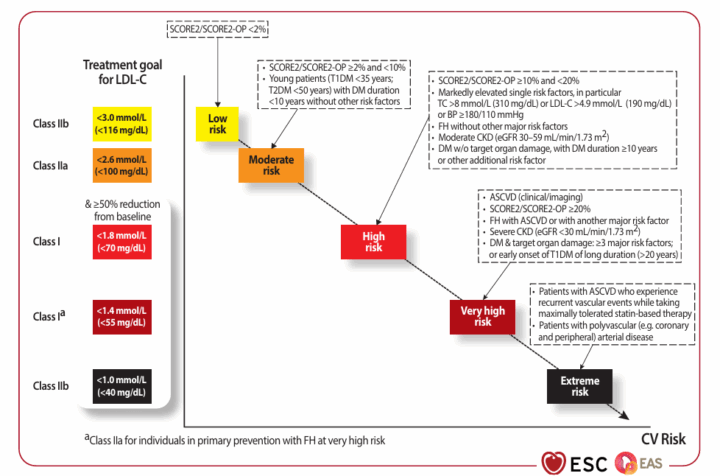
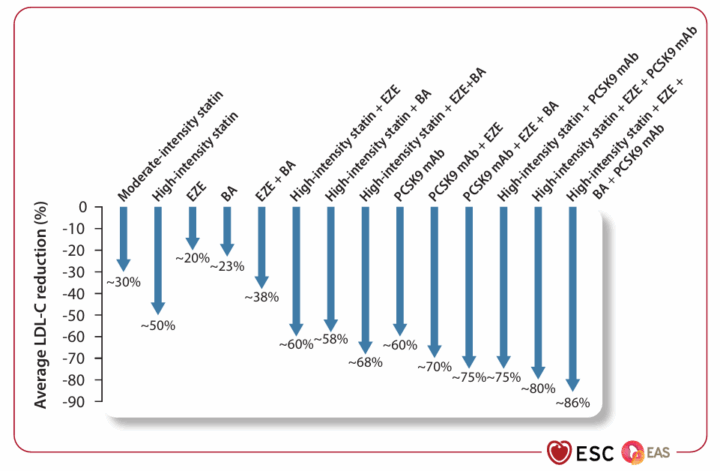
Key Updates for Patients
Familial Hypercholesterolaemia (HeFH & HoFH)
For those living with inherited high cholesterol, the update introduces new therapies. Alongside statins, ezetimibe, and PCSK9 inhibitors, additional medicines such as bempedoic acid and, for HoFH, the antibody evinacumab, are now recommended as effective options. These treatments can provide stronger LDL-cholesterol lowering, where older drugs may not have been enough.
Elevated lipoprotein(a) [Lp(a)]
High levels of Lp(a) are now more clearly recognised as an important risk factor for heart disease and aortic valve disease. The guidelines recommend that everyone should have their Lp(a) checked at least once in their lifetime. For those with very high levels, the update advises early and intensive cholesterol-lowering treatment, even while we await the arrival of specific Lp(a)-lowering medicines currently in clinical trials.
Familial Chylomicronaemia Syndrome (FCS)
For the first time, the update makes a strong recommendation for volanesorsen, a treatment shown to lower triglycerides by up to 77% and reduce the risk of pancreatitis in people with FCS. This represents a major step forward for a condition that has long had very limited treatment options.
These updates are part of a continuing shift towards earlier, stronger, and more personalised lipid management. The message is clear: lowering LDL-cholesterol and addressing risk factors like Lp(a) and triglycerides saves lives.
The full guideline update has been published in both the European Heart Journal and Atherosclerosis.
And don’t forget: FHEF will host upcoming patient-friendly webinars to explain these changes further.
✨ Together, we are moving closer to a future where patients with inherited lipid disorders can live longer and healthier lives.
The European Commission has officially launched a public consultation on the EU Cardiovascular Health Plan—a long-anticipated and vital step forward in shaping the future of cardiovascular disease (CVD) prevention and care across the EU.
This is a historic opportunity for our community to ensure that inherited lipid disorders—including familial hypercholesterolaemia (FH), homozygous FH, elevated lipoprotein(a) [Lp(a)], and familial chylomicronaemia syndrome (FCS)—are fully recognised as major risk factors for cardiovascular disease in EU-level health policy.
The consultation is more than a formality—it’s a chance to influence the EU’s strategic direction on cardiovascular health. We must advocate for:
Over the years, FH Europe Foundation, in collaboration with our network of patients, clinicians, researchers, and policy advocates, has laid the groundwork for this moment. Key milestones include:
These achievements have helped build the momentum we now see reflected in this EU-level initiative.
The consultation is open until 15 September 2025 and is hosted on the European Commission’s platform (registration required). We encourage all stakeholders—patients, clinicians, researchers, and advocates—to participate and make their voices heard.
FH Europe Foundation is coordinating a comprehensive response, drawing on insights from our Network Leaders, Patient Ambassadors, Scientific Experts, and industry partners. Our submission will combine robust scientific evidence with the lived experiences of those affected by lipid conditions.
We will share our final position with the community to ensure transparency and alignment, and to empower others to advocate effectively.
Together, we can shape a Cardiovascular Health Plan that truly reflects the needs of our community.
📅 Deadline: 15 September 2025
PRESS RELEASE
A new study* shows routine testing for a little-known cardiovascular threat could prevent heart attacks, strokes, and save millions in health costs.
Most people have heard of cholesterol. But there’s another dangerous lipid in the blood – lipoprotein(a), or Lp(a), which if high in levels, could be silently putting millions at risk.
An international study led by Professor Zanfina Ademi and her Team at Monash University (Melbourne, Australia) reveals the cost effectiveness of testing high levels of Lp(a), a genetic and lifelong risk factor for heart disease affecting nearly 1 in 5 adults.
“This is one of the biggest blind spots in heart health,” said Professor Zanfina Ademi, a health economist and senior author of the study. “You can have a healthy lifestyle and normal cholesterol, but if your Lp(a) is high, you’re still at serious risk.”
Cardiovascular disease remains the world’s leading cause of death. In Australia, it costs over $14 billion a year; in Europe, that number soars to €282 billion. Yet Lp(a), which cannot be improved by diet or exercise, is not part of routine testing in most healthcare systems.
Published in Atherosclerosis, the study analysed data from over 10,000 adults in the UK. The results were striking: routine Lp(a) testing would have reclassified 20% of participants as high-risk, leading to earlier intervention with blood pressure or cholesterol-lowering medications.
In the same issue, Prof. Jan Boren, Editor-in-Chief of Atherosclerosis, issues a call to action in an editorial**, urging guideline developers and policymakers to act: “When a simple blood test can help prevent life-threatening cardiovascular events and improve quality of life, all in a cost-effective way, implementing such testing isn't just advisable, it's imperative”.
The modelling showed that, testing could prevent 60 heart attacks, 13 strokes and 26 early deaths (per 10,000 people tested). While adding 217 years and 255 years of healthy life – all while saving approximately $85 and £263 per person in Australia and in the UK respectively in medical and productivity costs. Researchers tested this approach in nine high income countries and found the same result everywhere: regularly testing for Lp(a) could save money in all their healthcare systems.
“This is a game-changer,” said Professor Florian Kronenberg of the Medical University of Innsbruck, Chair of the Lp(a) International Taskforce. “A one-time test could prevent countless tragedies and is one of the most cost-effective tools we have.”
The research helped inform the Brussels International Declaration on Lp(a) Testing and Management, a new global policy roadmap calling for Lp(a) to be included in national cardiovascular screening programs.
Magdalena Daccord, CEO of FH Europe and co-author of the study, said: “Most people think they’re safe if their cholesterol is normal. But Lp(a) is often the missing piece. This simple test can save lives. The science is here – now it’s time to act.”
Commissioned by the Lp(a) International Taskforce and hosted by the FH Europe Foundation (FHEF), this patient-driven research initiative was led by the Centre for Medicine Use and Safety at the Monash Institute of Pharmaceutical Sciences, in collaboration with global researchers and the Lp(a) International Taskforce. The study forms part of a broader multistakeholder effort to advance understanding and action on Lp(a).
* Lp(a) testing for the primary prevention of cardiovascular disease in high-income countries: a cost-effectiveness analysis.Jedidiah I Morton, Florian Kronenberg, Magdalena Daccord, Nicola Bedlington, Marius Geantӑ, Tobias Silberzahn, Zhenyue Chen, Jean-Luc Eiselé, Bogi Eliasen, Mariko Harada-Shiba, Marc Rijken, Albert Wiegman, George Thanassoulis, Pia R Kamstrup, Iñaki Gutiérrez-Ibarluzea, Pablo Coral, Raul D Santos, Erik Stroes, Michal Vrablík, Gerald F Watts, Christie M Ballantyne, Samia Mora, Børge G Nordestgaard, Kausik K Ray, Stephen J Nicholls, Zanfina Ademi, On behalf of the Lp(a) International Taskforce (ITF) initiative.
Atherosclerosis. https://doi.org/10.1016/j.atherosclerosis.2025.120447
** The test that pays for itself: Why we can no longer afford to ignore Lp(a). Jan Borén (editor-in-chief of Atherosclerosis)
Atherosclerosis. https://doi.org/10.1016/j.atherosclerosis.2025.120468